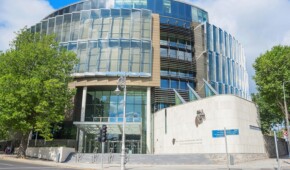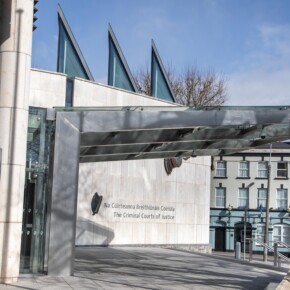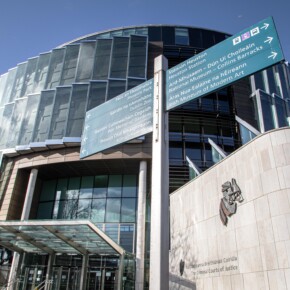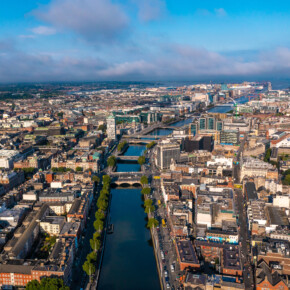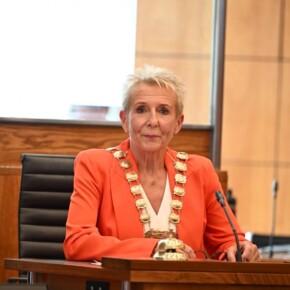Local concerns raised over Southside Metrolink works
Mike Finnerty 27 Mar 2024
The oral hearings for Metrolink have continued, with locals telling of potential upheaval should the project proceed as planned.
A protest took place over plans to level the Markievicz centre to make way for the Metrolink last week.
Located on Townsend Street, the Markievicz centre is the only 25-meter public pool in Dublin city centre, but it will face demolition along with nearly 80 homes in the area.
John Dean from Save Markievicz campaign told FM104 “it’s ridiculous the buildings are being levelled in the middle of a housing crisis.
“It’s madness; they’re good quality home as well.”
Under the current plans, 70 apartments in College Gate and 8 homes on Townsend Street will be demolished.
The work will take place to facilitate the construction of the Tara Street station.
Ryan noted that homeowners would be compensated as part of the works, but it also meant that 78 homes would be removed from the local housing stock in the midst of a housing crisis.
The Save Markievicz campaign claimed, “this demolition is completely unnecessary; Metrolink can be built without it.”
“There has been a public swimming pool in this area for over 130 years. Despite this, the government wants to tear it all down along with the 78 homes. This is an attack on the inner-city community, we need to stand up and show we won’t allow it to happen.”
Over 2,000 people have signed a petition calling for the demolition not to go ahead, and suggested using the site of Apollo House as a suitable alternative.
In 2019, the National Transport Authority stated they would fund and reinstate a new leisure centre in place of the Markievicz centre should the project go ahead, with the NTA saying the plan was contingent on Dublin City Council finding a suitable site.
Townsend Street resident Áine Wellard told the hearings that the Metrolink should not go ahead as it would cause major disruptions to her life.
Wellard, who lives in a house provided by Dublin City Council house, said she is blind and was reluctant to leave her home having lived in the area for 43 years.
She said moving house would be a hindrance because all of the services she avails of are within easy reach for her.
“I have a guide dog and a cat and my vet is very easily accessible from my home by bus,” she told the hearing.
She also said that her GP is accessible on a “straightforward” route and didn’t wish to complicate her routine.
“Moving, for me, means having to learn new routes and I will lose access to services; I implore An Bord Pleanála to stop the demolition of my home and the homes of the other residents.”
Wellard criticised the TII for failing to adequately communicate ever since the route was designed back in 2019.
The hearing was told that delays getting letters and documents sent to her in braille were common and was only informed by a local Councillor that her home could fall under compulsory purchase orders.
Wellard also questioned if Dublin City Council had enough houses in stock and said “nothing” would match the current home she lived in.
TII representatives said that choosing the site of the Tara Street station was “a very difficult decision” but was the most “practical” of the 11 proposed options.
Other options involved making that particular part of the line underground and moving all residents out of their homes for two years while work was being carried out.
Michael Horan, head of land and property services at TII, said they were engaging with Dublin City Council on any and all concerns.
“We have agreed that a relocation requirement will be addressed and that suitable accommodation will be sourced that will be as close as possible to the current location,” he said.
The meeting also heard from College Gate residents Nicola Brait and Greta Tumiatti who said that they had signed off documentation to purchase a home only after renting in the area for 9 years only to shortly discover that their house would be knocked down to make way for the Metrolink.
“We went through all the emotions you can possibly think of,” their submission to the planning board read.
“We understand this is a strategic and very large project and important for Ireland nationally and we are not opposed to it, but the continuing impact on our lives physically and psychologically can not be underestimated.”
They added, “we live in this stressful limbo.”
Trinity College recently dropped its objections to the project, having cited concerns that the works could impact sensitive scientific equipment on the campus.
Trinity’s submission to the public hearings outlined concerns that vibrations from the construction work could affect machines such as MRI machines, microscopes and tweezer instruments.
However, the college said they had reached an agreement with Transport Infrastructure Ireland over the works, and are satisfied that the issues laid out by them have been sufficiently addressed.
In all instances, TII said they are “committed” to sorting out and hearing from relevant stakeholders.
The public hearings for the Metrolink project, which are expected to wrap up by the end of the month, have heard various objections from members of the public, business owners and elected representatives.
Once the hearings wrap up, it is expected that feedback and objections from the hearings will be implemented into the final design.
After decades of delays, the Metrolink is expected to be up and running by the middle of the 2030s.
The route will connect Dublin Airport to Dublin City Centre by underground rail for the first time ever, and will carry double the amount of passengers than the Luas does at peak capacity.
Metrolink boss Aidan Foley said that for every year the Metrolink is not built, €2 billion will be lost in economic productivity.
Green Party MEP Ciáran Cuffe said that it is important that the project proceeds as it would play a major part in tackling Dublin’s chronic traffic congestion.
“MetroLink is a transformative piece of infrastructure for Dublin that will bring a major shift towards sustainable transport,” he said.
“Investing in Metrolink will be pioneering in cutting down congestion, reducing emissions and allowing people to easily travel across Dublin.”


